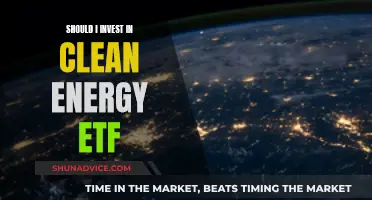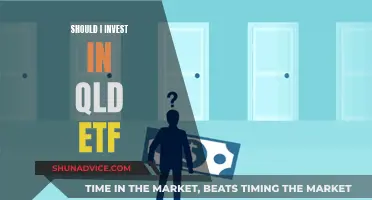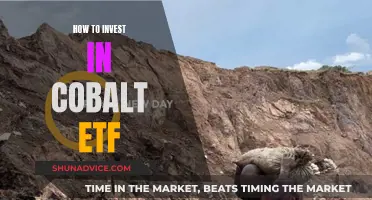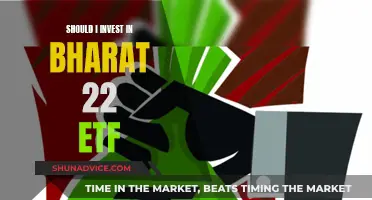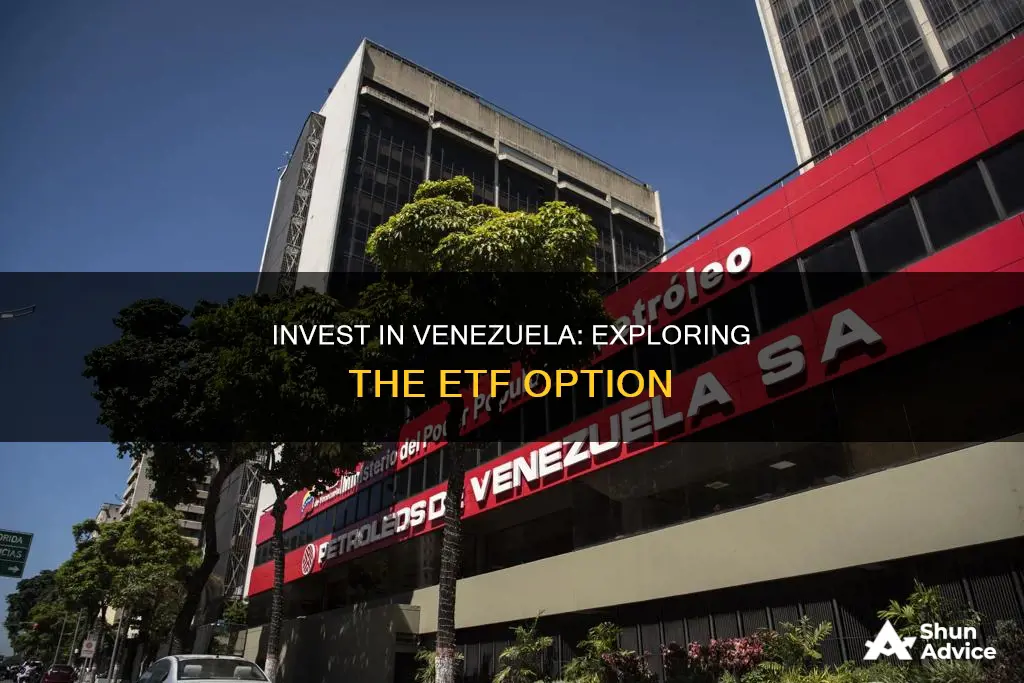
Venezuela has the largest oil reserves in the world, but the country's economy has suffered due to a decline in oil exports and political unrest. Investing in a Venezuela ETF can provide foreign investors with a diversified portfolio, but it comes with significant risks. The Caracas Stock Exchange or Bolsa de Valores de Caracas (BVC) is the only stock exchange in Venezuela, and it has experienced a severe decline in recent years. In 2018, the Caracas Stock Market Index was the worst-performing stock market, collapsing by 94%.
Despite the risks, there may be opportunities for high-risk, high-reward investments in Venezuela, particularly in the bond market. However, it's important to carefully consider the risks and do thorough research before investing in Venezuela ETFs.
| Characteristics | Values |
|---|---|
| Risk | High |
| Diversification | High |
| Historical Performance | Caracas Stock Market Index was the worst performer in 2018 after collapsing by 94% |
| Political Situation | Unstable |
| US Sanctions | In place |
| Primary Sector | Oil |
| Primary Motivation | High-risk, high-reward |
| Bond Yields | More than 24% |
| Stock Market | Caracas Stock Market Index |
| Currency | Bolivars |
| Political Unrest | High |
| Primary Importer of Oil | US |
| ETF Availability | Limited |
| Regime Change | Possible |
What You'll Learn

Venezuela ETFs: Risky but high-reward
Venezuela has the largest oil reserves in the world, but its oil exports have suffered due to low oil prices. As a result, the country has accumulated a significant debt, impacting its economy. However, investing in a Venezuela ETF can provide foreign investors with a diversified portfolio.
Historical Performance
In 2012, Nasdaq named Venezuela the top-performing stock market globally, with equities more than tripling in value. This made Venezuela an attractive investment destination for foreign investors. However, there were no equity ETFs available at the time, limiting investment options.
Risk Factors
Venezuela's economy is heavily reliant on oil exports, and the drop in oil prices since 2014 has had a detrimental effect. Political unrest and US sanctions on crude oil from Venezuela have further exacerbated the situation. Additionally, there is a risk of the government seizing assets and engaging in other corrupt practices.
Current Opportunities
Despite the risks, there are still opportunities for investors, especially those seeking high-risk, high-reward investments. With the price of bonds being low and Venezuela defaulting on its debts, investors can potentially take advantage of buying bonds at steep discounts and selling them later at a profit.
Investment Options
When considering investing in Venezuela, there are a few options to explore:
- ETFs: Exchange-Traded Funds (ETFs) allow you to buy shares in a fund that contains multiple stocks. ETFs are ideal for investing in the Venezuelan stock market as a whole or for investors who don't have the time or expertise to pick individual stocks.
- Robo-advisors: Automated investment platforms that use algorithms to buy and sell stocks for you based on your goals and risk tolerance.
- Stock CFDs: Contracts for Difference (CFDs) are financial products that allow you to speculate on stock price changes and are designed for rapid buying and selling based on technical analysis.
Final Thoughts
Investing in Venezuela ETFs can be risky due to the country's economic and political situation. However, for investors comfortable with high-risk investments, there may be opportunities for significant returns. It is essential to carefully consider your investment goals, budget, and risk tolerance before deciding to invest in Venezuela.
Marijuana Index ETF: A Smart Investment Strategy
You may want to see also

Caracas Stock Market Index: The only viable stock market in the country
Caracas Stock Market Index: The Only Viable Stock Market in Venezuela
The Caracas Stock Market Index is the only viable stock market in Venezuela. In this guide, we'll outline the current state of the Caracas Stock Market Index and provide an overview of the risks and opportunities for investors.
History of the Caracas Stock Market Index
The Caracas Stock Exchange, also known as Bolsa de Valores de Caracas (BVC), was founded in 1947 and is the sole stock exchange in Venezuela. Historically, the Venezuelan stock market has been volatile, delivering both impressive gains and significant losses for investors. For example, in 2013, despite hyperinflation and economic challenges, the Caracas Stock Market Index was the world's best-performing market, with gains of over 450%. However, in 2018, the market collapsed by 94%, making it the worst-performing stock market globally.
Current State and Performance
As of 2021, the Caracas Stock Exchange has seen an increase in activity and a recovery in market capitalization. The number of companies issuing debt in the stock market has grown from 4 in 2017 to 32, and the weekly trade volume has increased to 250-300 trades, three times the volume in 2017. The market capitalization, which had plummeted to $1.2 billion in 2020, recovered to near the $2 billion mark in 2021.
Risks and Challenges
Investing in the Caracas Stock Market Index comes with significant risks. Venezuela's economy is heavily reliant on oil exports, and the drop in oil prices since 2014 has had a detrimental impact. Additionally, political unrest, US sanctions, hyperinflation, and the government's history of seizing assets create an uncertain environment for investors. The Caracas Stock Market Index trades in Bolivars, and the skyrocketing inflation rates have effectively rendered the stock market worthless.
Opportunities for Investors
Despite the risks, there may be opportunities for investors, especially those seeking high-risk, high-reward opportunities. With Venezuela defaulting on its debts and the price of bonds extremely low, there is potential for substantial returns if the country's economic and political situation improves. Additionally, the Caracas Stock Exchange's recent growth in activity and market capitalization could indicate a shift towards recovery.
Final Thoughts
Investing in the Caracas Stock Market Index is not for the faint-hearted. While there may be potential for significant gains, the risks are considerable, and the direction of the market is highly dependent on political and economic factors that are difficult to predict. Investors considering the Caracas Stock Market Index should carefully assess their risk tolerance and conduct thorough due diligence before committing any capital.
Strategic ETF Investments: How Often Should You Buy?
You may want to see also

US sanctions: Impact on Venezuela's economy
The US imposed some of the harshest sanctions on Venezuela from 2017 to 2022, targeting the country's oil, gold, and banking sectors. These sanctions contributed to Venezuela's economic collapse, exacerbating the impact of the country's pre-existing macroeconomic imbalances and populist policies. The sanctions accounted for around 52% of Venezuela's economic contraction between 2012 and 2020, with GDP per capita declining by 71%.
The sanctions blocked Venezuela's state-owned oil company, PDVSA, from accessing US markets, diverting oil exports to other countries like China and India at discounted prices. This resulted in a sharp decline in oil production and a loss of more than $11 billion in export proceeds over a year. The sanctions also prevented the Venezuelan government and PDVSA from borrowing, restructuring debt, or receiving dividends from its subsidiaries, further crippling their finances.
The impact of these sanctions extended beyond Venezuela's government and affected the daily lives of ordinary Venezuelans. The country faced severe shortages, hyperinflation, and a migration crisis, with more than seven million people fleeing the country since 2014. The economic collapse led to a humanitarian crisis, with Venezuelans struggling to access food, medicine, and other essential goods.
While the sanctions aimed to force President Nicolás Maduro out of power, they had the opposite effect. They helped Maduro consolidate control by increasing the power asymmetry between the state and an impoverished civil society. Additionally, Maduro was able to use the sanctions as evidence of an ""economic war" waged by the US, rallying Venezuelans behind a common enemy and boosting his popularity.
In 2022, the Biden administration eased some sanctions and pursued negotiations with the Maduro government, recognizing the limited effectiveness of punitive measures. However, the negative impact of the sanctions on Venezuela's economy and the livelihoods of its people is undeniable. The sanctions contributed to the economic catastrophe that drove millions of Venezuelans to flee the country and worsened the humanitarian crisis.
Barefoot Investing: Choosing the Right ETF
You may want to see also

Political unrest: A challenge for investors
Venezuela's economic and political crisis has reached a boiling point, and it serves as a cautionary tale for investors. The country's large oil reserves provided it with great wealth and a growing middle class. In the 1970s, Venezuela had the highest per capita income in Latin America and was viewed as a good investment destination. However, when oil prices dropped in 2014, Venezuela's economy suffered as it relied heavily on oil exports. The country accumulated an outstanding debt, which has led to food and medicine shortages, and a decline in productive capacity.
The political situation in Venezuela has transitioned from a fragile democracy to an entrenched authoritarian regime under President Nicolás Maduro. The US has imposed sweeping oil and financial sanctions on the country, which have contributed to the economic collapse. Venezuela's migration crisis has also affected the US, with more than 900,000 Venezuelans attempting to cross the southern border in the past five years. The political unrest in Venezuela makes it challenging for investors to predict the direction their investments will take. The government is notorious for seizing assets, and with the US being the leading importer of Venezuela's crude oil, investors are vulnerable to the sanctions imposed by the US.
The Caracas Stock Market Index is the only viable stock market in Venezuela, and it trades in Bolivars, not dollars. When it skyrocketed to 200,000%, it indicated that the stock market had become worthless. Investing in Venezuela ETFs is risky, and even bond managers have pulled out of investing in the country's ETFs. The sanctions imposed by the US make it impossible for US investors to take advantage of buying bonds at steep discounts and selling them later at a profit. However, there is still hope for investors who are willing to take on high-risk, high-reward investments. Small investment funds have started purchasing heavily discounted bonds, and there is potential for high returns if the political situation stabilizes.
Venezuela's economic and political crisis highlights the need for political risk insurance for investors. The situation in Venezuela has provided insight into which sectors or companies are most at risk of government expropriation. Foreign companies, large employers, and consumer product companies are often targeted by the Venezuelan government. Political risk insurance can help mitigate losses for companies operating in emerging markets, and analytics can be used to quantify corporate risks.
Axis Technology ETF: A Smart Investment Strategy
You may want to see also

Venezuela's oil industry: Backbone of the economy
Venezuela has the world's largest proven oil reserves, with an estimated 304 billion barrels (18% of global reserves) as of 2020. The country was once the largest exporter of petroleum worldwide, but its production has declined significantly over the years, and Saudi Arabia has since overtaken it. Venezuela's oil industry has a long history, dating back to the early 16th century when the Spanish conquistadors learned to use the naturally occurring bitumen for caulking their ships. The first documented shipment of petroleum from Venezuela was in 1539 when a single barrel of oil was sent to Spain.
The modern history of Venezuela as a major oil producer began in 1922 with the discovery of the Barroso No. 2 well in Cabimas. This led to a rush of foreign companies acquiring land in the country, hoping to strike oil. By 1928, Venezuela had become the world's leading oil exporter, and its oil industry began to dominate all other economic sectors. Venezuela's oil production peaked in the late 1990s and early 2000s, with exports of oil booming during this period. However, the country's over-reliance on the oil industry had negative consequences, as agricultural production decreased dramatically, and Venezuela struggled to create and maintain other industries.
In recent years, Venezuela's oil industry has faced several challenges, including a lack of investment, frequent fires and outages at its aging infrastructure, and U.S. sanctions since 2019. These factors have contributed to volatile exports and a decline in production. Despite these issues, Venezuela's oil exports approached 1 million barrels per day (bpd) in late 2024, fueled by sales to its mainstay customers in Asia, mainly China. The incoming government of President-elect Donald Trump is expected to revise U.S. policies towards Venezuela, which could lead to changes in sanctions and potentially impact the country's oil industry.
While Venezuela's oil industry has faced difficulties, it remains a crucial sector for the country's economy. The future of the industry may depend on political developments, such as the potential ousting of President Maduro and the lifting of U.S. sanctions. Despite the risks, some investment funds have been attracted to the high-risk, high-reward nature of investing in Venezuela's bonds, hoping to take advantage of the low prices and potential for significant returns.
A Simple Guide to Investing in SBI Nifty 50 ETF
You may want to see also
Frequently asked questions
Investing in a Venezuela ETF can provide foreign investors with a diversified portfolio, but it is also a risky move given the country's economic and political situation. While Venezuela was once the largest petroleum exporter, its oil production has significantly declined, and US sanctions on its crude oil exports have further impacted its economy.
Venezuela's economy has been struggling due to a combination of factors, including a decline in oil prices, outstanding debt, hyperinflation, and political unrest. These issues have led to a significant drop in the country's stock market performance.
Yes, investing in Venezuela ETFs carries significant risks. The country's economy is heavily reliant on oil exports, and US sanctions on crude oil have worsened the economic situation. Additionally, there is political unrest, and the government has a history of seizing assets.
Despite the risks, there may be potential benefits for investors who are comfortable with high-risk, high-reward situations. With the price of bonds being low and Venezuela defaulting on its debts, there could be opportunities for high returns on bond investments.
To invest in Venezuela ETFs, you would typically need to create a brokerage account with a trading platform that offers access to Venezuelan stocks. Make sure to do your research and understand the risks and potential rewards before investing.



